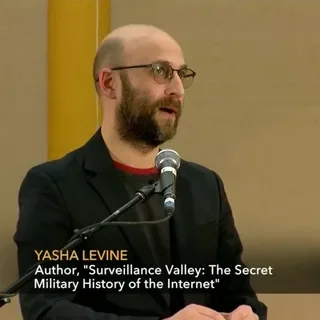| Previous
Page |
PCLinuxOS
Magazine |
PCLinuxOS |
Article List |
Disclaimer |
Next Page |
Surveillance Valley: Book Review |
|
by Agent Smith (Alessandro Ebersol)  I have been writing for some time now about the shadowy relations of technology companies with the US government's espionage and military agencies. But ... what if things were worse than we think? What if all the history we have, that we hear about, that we accept as the history of the World Wide Web was just a fairy tale? A "cute" facade for a much more terrifying truth? That is the premise of the book "Surveillance Valley", by author Yasha Levine. A fairy tale ? Or a horror story ? I started reading Yasha Levine's book, and right from the introduction, it's a punch in the gut: Levine takes us to a meeting, which he attended, in 2014, at Oakland City Hall. In his words, "Several hundred people packed the Oakland city council chamber. Many of them carried placards. It was an angry crowd, and police officers flanked the sides of the room, ready to push everyone out if things got out of hand." Levine continues: "The commotion was tied to the evening's main agenda item: the city council was scheduled to vote on an ambitious $11 million project to create a citywide police surveillance center. Its official name was the "Domain Awareness Center" - but everyone called it "the DAC." The project specifications called for linking real-time video footage from thousands of cameras across the city and would concentrate them all in a unified control center. The police would be able to punch in a location and watch it in real time. They would be able to link facial recognition and vehicle tracking systems, link social media feeds, and enhance their vision with data coming from other law enforcement agencies - both local and federal." Plans for this surveillance center had been brewing for months, and the scandal was now making its presence felt. Residents, religious leaders, labor activists, retired politicians, masked anarchists from the "black bloc" and representatives of the American Civil Liberties Union - all were present, rubbing shoulder to shoulder with a group of dedicated local activists who had banded together to stop the DAC. A nervous, good-natured city official in a tan suit took the podium to assure the boisterous crowd that the Domain Awareness Center was designed to protect them - not spy on them. "This is not a fusion center. We have no agreements with the NSA or the CIA or the FBI to access our databases," he said.  Oakland City Hall The hall exploded in pandemonium. The crowd couldn't believe it. People booed and hissed. "This is all to monitor the protesters," someone shouted from the balcony. A young man, his face obscured by a mask, stalked to the front of the room and menacingly jammed his smartphone into the city official's face and took pictures. "How does it feel? How does it feel to be watched all the time?" he shouted. A middle-aged man wearing glasses and crumpled khakis stepped up to the podium and ripped into the city's political leaders. "Do you council members somehow believe that the Oakland Police Department, which has an unparalleled history of violating the civil rights of Oaklanders and which cannot even follow its own policies, be it a crowd control policy or a body camera policy, can somehow be trusted to use the DAC?" He went out with a bang, shouting, "The only good DAC is a dead DAC!" Wild applause erupted. The people gathered at City Hall that night saw Oakland's DAC as an extension of the technological gentrification that was pushing the poorest long-time residents out of the city. "We are not stupid. We know that the goal is to monitor Muslims, black and brown communities and protesters," said a young woman with a headscarf. "This center comes at a time when you are trying to turn Oakland into a playground and bedroom community for San Francisco professionals. These efforts require you to make Oakland quieter, whiter, less scary, and richer - and that means getting rid of the Muslims, the black and brown people, and the protesters. You know this and so do the contractors. We hear them in meetings." "They are scared. They admit it verbally." And, the fears were not unfounded. A few months earlier, a pair of investigative journalists in Oakland had obtained a series of internal city planning documents dealing with the DAC, they found that city officials seemed to be more interested in using the proposed surveillance center to monitor political protests and union activity on the Oakland docks than in fighting crime. But, according to Levine, the DAC surveillance center had another partner. A partner that didn't appear directly. A silent partner. Who could it be? Levine continues: "Thanks to a tip from a local activist, I had learned that Oakland had been in talks with Google about demo products in what appeared to be an attempt by the company to get a share of the contract with DAC." But how? Google getting involved in facial recognition and cyber surveillance of citizens, often innocent and warrantless? Yes, and Don't Be Evil is long gone, eons ago. And so begins the book, which already in its introduction, tells us about Google's involvement in more surveillance, something we are already used to. It is no longer surprising. But when the book came out, at the time of the Cambridge Analytica scandal, it was fresh material. The Internet, in the words of Yasha Levine "Everything we've been sold about the democratic nature of the Internet has always been a marketing pitch." Yasha Levine, on the military origins of the Internet, on data modeling and technocratic government, and why the Cambridge Analytica scandal was good for Facebook. In his book, Yasha Levine raises the military and governmental nature of the Internet, with an interesting hypothesis, that the Internet exists primarily as a tool for surveillance and control of the masses. That's right, everything you have always heard about how the Internet was born as a means of human expression and growth, is not the whole truth. And, Mr. Levine raises all the data to back up his claims. And, he does some historical research on how technology companies helped the military, from the Vietnam war, to IBM's shady dealings with Adolf Hitler's government in World War II.  How the book is made up The book is divided into two parts: the lost history of the Internet, which deals with the roots of the Arpanet, which would, years later, become the Internet we have today.  In his research, Levine goes all the way back to the Vietnam War, making a very interesting parallel about how technologies used against the Vietnamese were also used against North American citizens. The first part then focuses on the government's shift to technological solutions dealing with the Vietnam war and counterinsurgency. Sure, there was a lot of applied technology developed (Agent Orange, sensors to be spread throughout jungles), but also entire counterinsurgency systems that were focused on accumulating data on potential enemies (which could be anyone). So when the end of the Vietnam war was in sight, these same techniques were being applied to American civil society, plagued by political unrest due to the civil rights struggle, struggles with communism and so on. The Second Part... He then spends a lot of time focusing on the 1980s and the rise of the various utopian visions of technology. Here the author's political views become a bit of a distraction: characters are introduced and dismissed as libertarian, or as coming from what is clearly the "wrong background." The Electronic Frontier Foundation, in a sense the ACLU of technology-centric issues, is dismissed somewhat as the product of a "couple of millionaires" who attended a forum. One can only imagine how the author would reflect on any of the other institutions in the book that he *doesn't* describe how they were formed. Finally, he spends time on the Snowden and NSA revelations, along with the Tor project. The Tor Project Here, the author creates one of the wildest theories I have ever heard. But because it is so incredible, it may be true. It turns out that TOR is a service designed and built by the CIA, and even though TOR is now a non-profit organization, it is almost entirely funded by annual "donations" from a handful of US government agencies, most of them connected - to the CIA. The NSA sees the TOR as a giant "honeypot" where all the types of people they are looking for (drug dealers, jihadists, terrorists) gather in one place. They can be tracked and found with little effort. So while the government bemoans the criminals hiding in plain sight on TOR, it also encourages the use of TOR with taxpayer money.  How could this be possible? It seems that CIA agents using TOR to hide their online identities were immediately recognized as CIA agents because their activity showed that they came from TOR, so they must be spies. Therefore, the user base had to be expanded in order to hide the spies - in plain sight. Yasha Levine obtained a box full of documents from the Broadcasting Board of Governors, another branch of the CIA, using the Freedom of Information Act. Everything is spelled out clearly and bluntly, including CIA updates on technical progress at the supposedly independent non-profit. Levine says that TOR employees are essentially federal civil servants. This book is a warning that you never know who your friends are, and that everything can be turned into a weapon. Final Words Reading this book is an interesting exercise in thinking outside the box. Not that reality is as bleak as Levine paints it, but that big tech's, along with tyrannical governments, whether in the West or the East, since much of the surveillance done by these corporations is already used by so-called "democratic" governments (the arrest of Julian Assange in England, the actions against Chelsea Manning, and the persecution of Edward Snowden are just a few cases, about individuals who denounced human rights abuses, perpetrated by governments, through big tech's, and, suffered bitterly afterwards. No, not Saudi Arabia, nor North Korea, but the democratic countries of the United States of America and England).  Book: "Surveillance Valley -- The Secret Military History of The Internet" Author: Yasha Levine Site: https://surveillancevalley.com
Barnes & Noble:
Bookshop.org: Please don't buy from Amazon. Let's not give any more fuel to one of the most dishonest internet companies that exists today. |


